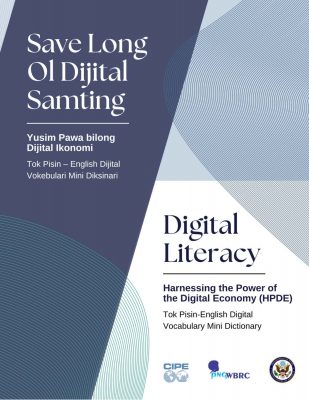 The creation of this Tok Pisin-English digital vocabulary mini-dictionary addresses several needs for modern communication and learning in Papua New Guinea (PNG). The country of approximately 10 million people has three official languages: English, Hiri Motu, and Tok Pisin, local pidgin, which is the most widely used language. Given PNG’s unique linguistic and digital landscape, many English words, especially those pertaining to digital systems, are simply not part of the Tok Pisin language. The need to develop this mini dictionary arose organically during efforts to translate training materials on digital rights and the digital economy. It became clear that this could not be completed without first establishing a uniform Tok Pisin vocabulary for digital technology related terms. Thus, this mini dictionary was developed with the purpose of being used for the translation of the modules from “Harnessing the Power of the Digital Economy (HPDE): MSME Guide to Digital Transformation” as its main priority. The target audience of the training course, those who are at least semi-literate with basic digital literacy, were kept in mind when creating this resource.
The creation of this Tok Pisin-English digital vocabulary mini-dictionary addresses several needs for modern communication and learning in Papua New Guinea (PNG). The country of approximately 10 million people has three official languages: English, Hiri Motu, and Tok Pisin, local pidgin, which is the most widely used language. Given PNG’s unique linguistic and digital landscape, many English words, especially those pertaining to digital systems, are simply not part of the Tok Pisin language. The need to develop this mini dictionary arose organically during efforts to translate training materials on digital rights and the digital economy. It became clear that this could not be completed without first establishing a uniform Tok Pisin vocabulary for digital technology related terms. Thus, this mini dictionary was developed with the purpose of being used for the translation of the modules from “Harnessing the Power of the Digital Economy (HPDE): MSME Guide to Digital Transformation” as its main priority. The target audience of the training course, those who are at least semi-literate with basic digital literacy, were kept in mind when creating this resource.
CIPE supports Pacific Islands partners to achieve a digital future with an open, secure, and reliable internet in which democracy delivers tangible benefits and the opportunity for all to prosper.
To learn more about CIPE’s digital governance work in the Pacific Island region, check out the resources highlighted below:
- Papua New Guinea’s Digital Transformation: Understanding Legal and Regulatory Challenges
- Papua New Guinea’s Digital Transformation: Understanding the Governance Structure
- Understanding the Regulatory Environment for ICT Infrastructure in Papua New Guinea: A Case Study on the Integrated Government Information System (IGIS)
- Understanding the Regulatory Environment for ICT Infrastructure in Papua New Guinea: A Case Study of the Coral Sea Cable System
Published Date: February 26, 2024
